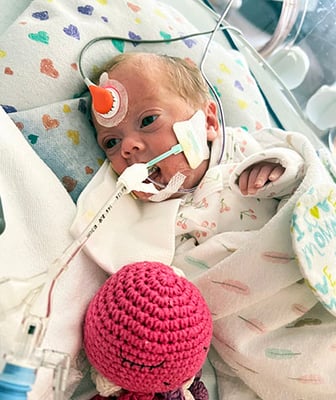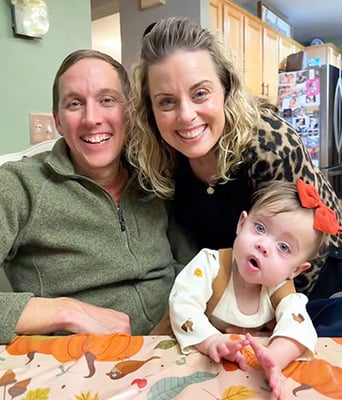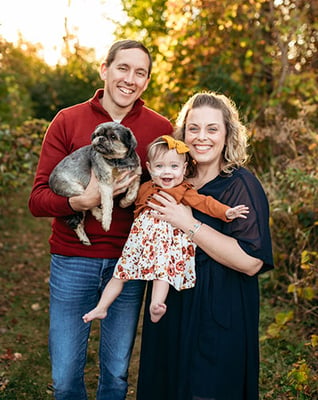
A New Way Forward: How a Special NICU Team Helps the Smallest Babies Breathe
In the early morning of Nov. 11, 2023, a few hours before her baby shower, April Kumlien began having horrible stomach pain. She thought she was experiencing typical pregnancy symptoms and online searching didn’t provide any answers.
“I kept thinking, ‘I have to get some sleep. I’m having all of these people over,’” said April.
But April couldn’t get comfortable enough to fall back to sleep. Her husband, Adam, thought she was having appendicitis. But when April got up to use the bathroom, she suddenly found herself holding her baby’s feet. She wasn’t even seven months pregnant.
“I remember thinking, ‘You and me, God. We’re gonna do this,’” said April. “We did not come this far for it to end with me and my baby on the bathroom floor.”
Adam immediately dialed 911 and local police officers and EMTs were at the house within three minutes. At 5:09 a.m., EMTs helped deliver baby Caroline. She was only 2 pounds, 5.4 ounces. She also wasn’t breathing and didn’t have a heartbeat. The EMTs immediately began lifesaving measures while arranging transport to a hospital near their home in Hartford, Wisconsin.
After 45 minutes of chest compressions, April remembers one EMT asking another, “When do we stop?” The answer was, “We don’t.”
“Later on, Adam and I looked at the video camera footage on our doorbell and could see one EMT straddling Caroline on the stretcher giving her chest compressions while they loaded her into the ambulance,” said April. “Without the EMTs, I don’t want to think about what would have happened.”
A Series of Fortunate Events
 Initially, Caroline was transported to a local hospital that had ceased labor and delivery operations seven years prior. Even when they did offer labor and delivery, they weren’t equipped to care for micropreemies. And yet, in a grand stroke of fate, the local emergency department had recently conducted on-site training and had a breathing tube small enough for Caroline. The staff intubated Caroline so she could breathe and got her heart beating. Due to weather, Flight for Life was unable to take off, so the Children’s Wisconsin Transport Team came to pick Caroline up.
Initially, Caroline was transported to a local hospital that had ceased labor and delivery operations seven years prior. Even when they did offer labor and delivery, they weren’t equipped to care for micropreemies. And yet, in a grand stroke of fate, the local emergency department had recently conducted on-site training and had a breathing tube small enough for Caroline. The staff intubated Caroline so she could breathe and got her heart beating. Due to weather, Flight for Life was unable to take off, so the Children’s Wisconsin Transport Team came to pick Caroline up.
In addition to being intubated, Caroline had a Grade II brain bleed and patent ductus arteriosus (PDA), a heart condition where a blood vessel that normally closes after birth remains open. Thankfully, both conditions stabilized on their own with time. Caroline’s biggest hurdle remained her breathing.
“We were hyper-focused on her breathing,” said April. “She was on a breathing tube for 96 days since she was premature and born at home so she didn’t get the steroids that would have helped her lungs develop.”
Due to this prolonged use of breathing assistance, Caroline developed bronchopulmonary dysplasia (BPD), a chronic lung disease and the most common complication of prematurity.
“BPD is the most common condition we see with prematurity, especially as we’ve seen babies born as early as 22 or 23 weeks of gestation survive,” said Kathryn Berlin, DO, a Neonatologist with Children’s Wisconsin.
BPD can hinder development and lead to ongoing breathing problems and respiratory illnesses, trouble feeding, delayed speech, learning difficulties, gastroesophageal reflux disease (GERD) and more.
“Babies who develop BPD often struggle with growth because they’re burning so many calories just trying to breathe,” said Dr. Berlin. “We especially have to work on feeding with babies who have been ventilated because breathing tubes can interfere with normal brain development. Infants are naturally wired to bring their hands to the center of their bodies, but when they have a breathing tube, we prevent that movement so they don’t pull the tube out.”
Forward Thinking
 Through another fortunate turn of events, about six weeks before Caroline’s birth, Children’s Wisconsin formalized a multidisciplinary team of providers in the NICU who care for babies with BPD. The Forward Team consists of specialists from physical, occupational and speech therapy, neonatology, pulmonology and pharmacy, plus nurse practitioners, case managers and care coordinators.
Through another fortunate turn of events, about six weeks before Caroline’s birth, Children’s Wisconsin formalized a multidisciplinary team of providers in the NICU who care for babies with BPD. The Forward Team consists of specialists from physical, occupational and speech therapy, neonatology, pulmonology and pharmacy, plus nurse practitioners, case managers and care coordinators.
Joanne Lagatta, MD, a Neonatologist with Children’s Wisconsin, is also a researcher who studies outcomes for infants with BPD and their families. She spearheaded the effort to develop the Forward Team after noticing how many babies had BPD and were going home with oxygen.
“BPD is a chronic disease, and it gets better with time and growth,” said Dr. Lagatta. “The goal of the Forward Team is to support babies’ development while they grow and heal, instead of trying to rush babies’ progress before they’re ready. We learned that if we listen to each other as a team, our babies have better outcomes without making them stay longer in the NICU.”
In addition to typical daily rounds, the Forward Team huddles once a week to discuss each patient in depth. Everyone from pulmonology to pharmacy offers input on the patient’s care and next steps. The physicians round a second time during the week with the nurses and therapists.
“Collaboration is the cornerstone to our program,” said Dr. Berlin. “We see each patient from a 1,000-foot view and from all angles. Everyone contributes insight, ensuring we’re not seeing patients in a silo or through our own singular lens.”
Since the implementation of the Forward Team, Children’s Wisconsin has decreased the percentage of patients going home with oxygen without increasing their length of stay.
“We’ve had better outcomes with BPD-specific teams, including improved screenings and quality care metrics,” said Dr. Berlin, who is also an Assistant Professor of Neonatology at the Medical College of Wisconsin, the academic partner of Children's Wisconsin. “Instead of trying to rush to the next milestone, we meet the babies where they’re at and focus on getting them bigger and stronger.”
Children’s Wisconsin is the only hospital in the state that provides this type of specialized, multidisciplinary care to its NICU patients — this type of innovation is made possible in large part due to the affiliation with the Medical College of Wisconsin. Children’s Wisconsin and other members of the BPD Collaborative meet monthly to discuss best practices, new research and even to talk through cases. The BPD Collaborative also offers a Zoom social hour for families to get support from one another.
Lifelong Connections
 April remembers when Children’s Wisconsin first approached her and Adam about the Forward Team.
April remembers when Children’s Wisconsin first approached her and Adam about the Forward Team.
“They told us they had a new specialty team with a core group of people who were going to know Caroline and know what her baselines were,” she said. “And it was true. The Forward Team KNEW Caroline.”
The Forward Team developed a specific plan for Caroline’s BPD needs and included insights from April and Adam during weekly rounds.
“The Forward Team was such an asset,” said April. “It was very much a conversation. Not only did they actively seek our input, but everyone was so willing to talk on our level. No stone was left unturned, and we felt very well prepared. Their relatability and vast knowledge sets Children’s Wisconsin and the Forward Team apart from other institutions.”
On Valentine’s Day 2024, 96 days after she was born, Caroline had her breathing tube removed. After 174 days at Children’s Wisconsin, Caroline went home on oxygen and a nasogastric (NG) feeding tube. In October 2024, she had surgery to transition to a G-tube, and shortly thereafter, was able to wean off oxygen completely. While Caroline continues with feeding therapy and in-home physical therapy, she has graduated from the BPD clinic.
Despite her harrowing entrance, Caroline is crawling, standing independently and walking with support.
“Caroline is hitting milestones even though she was intubated and flat on her back for 96 days,” said April. “We had the ultimate, best-of-the-best experience with Children’s Wisconsin and the Forward Team. That’s why Caroline is doing so well today.”
April says she will forever be grateful to and connected with the Forward Team.
“It’s not like you get discharged and they say, ‘have a good life,’” she said. “The Forward Team is still there to listen and offer help. They’re just good humans on top of being great at their jobs.”
Children's Wisconsin Resources

Written by
Jen Novotny
Writer
Related Stories
No related articles found.



